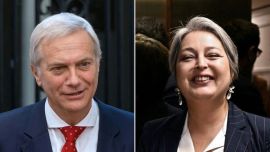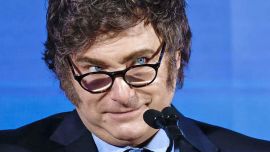Forty years ago, in the throes of Argentina’s brutal 1976-1983 military dictatorship, a number of parents came together under tragic circumstances. Their children had been abducted by the government, part of the estimated 30,000 people who were victims of the dirty war.
The group included Emilio Mignone, a lawyer today rem e m b e r e d a s o n e o f Argentina’s fiercest defenders of human rights. He began documenting cases of disappearances, providing legal assistance to families and spreading news about the dramatic scale of the state’s terrorism againts its citizens.
Eventually, the grassroots organisation grew into the Centro de Estudios Sociales y Legales (CELS). It would play a fundamental role in bringing to light the abuses and crimes against humanity committed by the military dictatorship and in promoting human rights reform once the regime fell.
However, the work did not end with the fall of the military government – over the coming decades, CELS would go on to become increasingly influential in defending the dignity and protecting the human rights of all Argentines.
As CELS celebrates the 40th anniversary of its founding, its executive director, Gastón Chillier, spoke with the Times to discuss the organisation’s history, future and the most pressing human rights issues in Argentina today.
How does the CELS of today compare to the CELS of 40 years ago?
There are many lines of continuity between now and then. It was founded by a group of people with family members who had been “disappeared,” intending to denounce the military government and fight for justice. We continue with that commitment and fight against impunity. Of course, there have been some changes that have broadened our vision beyond only combating institutional violence — the greatest of which is that we now advocate and incorporate groups who don’t have a direct tie to the dictatorship. In the 1990s, we brought into the fold groups like immigrants, the indigeneous, union workers, men and more. In the last 15 years, we’ve worked hard to defend the right to protest. I think of our organisation as many different sectors coming together for a grand commitment to defend human rights.
What is the state of the human rights movement in Argentina?
Argentina has a society that’s mobilised across distinct generations and across distinct movements. We have activated and incorporated a wide variety of interests in a way that’s only grown and amplified the human rights movement. What we have now is something much larger and more diverse, but with objectives that we share in common.
What are the biggest challenges to the movement?
Currently, the regional trend of re-militarisation. First, there’s the use of the armed forces to maintain internal security, using the excuse of things like terrorism or drug-trafficking to justify it. This has led to grave systemic violations like what we’re seeing in Colombia, Mexico and Chile. Then, there’s the return of former military actors to positions of political power. We’re seeing the emergence of leaders on the far right, far more conservative and bolstered politically by rhetoric that directly threatens the rights of most people. We see this in Bolsonaro in Brazil. Many of those leaders also have a strong tie to the business sector and they promote the concentration of wealth and the perpetuation of inequality.
How would you evaluate outgoing president Mauricio Macri and his government in this context?
Obviously, Macri is not the same as someone like Bolsonaro or Donald Trump. But, it seems to me, there are many elements of Macri’s government that do resemble this movement towards the right. His policies are more neoliberal, and his term ended with a phenomenal economic crisis, with thousands more poor people and with higher levels of inequality. He also supported the intensified use of armed forces and police, even if it meant abuse. So, no, he’s not like those others, but he still has a very poor record in these matters.
What do you anticipate from Alberto Fernández in terms of human rights?
I can’t speak to the agenda. But I do believe his election signifies a consensus in Argentina to reject militarisation and the creep towards authoritarianism. It seems there’s a widespread understanding of the importance of human rights. Macri’s one of the only leaders in the region in recent years that wasn’t able to maintain his mandate through re-election.
What do you say to critics who say CELS has become too partisan?
I don’t have a defensive response. We’re consistent with our founders. When we participate in a campaign, it’s because we want to bring in a government with the best human rights platform. Today, individual members of our organisation have their own opinions and, of course, we don’t prohibit them from having those. As for our organisation as a whole, we have an agenda of values, not of politics or partisanship.
Let’s talk about specific human rights issues Argentina faces today. First, the prosecution of crimes against humanity.
These didn’t slow down during Macri’s administration, really, because there aren’t ways for him to simply stop the judicial process. That said, the surrounding agencies that could make things go faster didn’t necessarily help [...]
Also, there was such a backlash when the government said the“2x1” [ruling] was applicable in these cases, that the courts and Congress quickly corrected course, saying it couldn’t be used for perpetrators of crimes against humanity. And, now, whenever world leaders come like Trump, Angela Merkel or many others, one of the first things they’re taken to see is the Parque de la Memoria or the ESMA [former Navy Mechanics School, used a clandestine detention centre during dictatorship].
Therefore, I think this government finally understands what it was ignorant to bef o r e — t h e r e ’s g r e a t relevance and importance to finding justice and memorialising Argentina’s past both here and worldwide.
And what about the push for abortion reform?
With Macri, we had a lot of ambiguity, especially last year during the failed legalisation fight. But then, we saw him and Maria Eugenia Vidal, the outgoing governor of Buenos Aires Province, with the blue scarf — a sign of the anti-abortion movement — at the end of this campaign [...] With Alberto Fernández, we have an explicit position. I believe he’s expected to achieve it, and that he will push it through the legislature [...]
Even though the Catholic Church and conservative northern provinces still wield great influence , I think it’s now inevitable, it’s just a matter of time [...]
Argentina’s society, especially its younger generations, realise that this is a question of public health and another part of the inequality discussion. It is going to be over soon.
There have been cases too about the use of lethal force by security forces...
It’s one of those things that’s not necessa r ily documented, but it’s clearly risen in recent years, especially under Macri. It’s obvious through the political discourse there’s more support and alignment with security forces. In the case of a potential abuse — as in the case of Luis Chocobar — the government will often protect, ally itself with and celebrate police instead of investigating the officer or guaranteeing the victim’s family justice [...]
Fernández is going to have to do a lot to reinstate a feeling of trust and legitimacy in the security forces and to disarm these policies promoted by the highest offices of power.
And what’s your view on the health of Argentina’s institutions?
The legacy of the last four years in this respect is very poor, as poor as the economic legacy [...] We see this even in the report that came out from the office of the United Nations High Commissioner for Human Rights last week. It points out a number of potential abuses and interventions that could violate the law.
Now, the government under Cristina Fernández de Kirchner didn’t have a good record with institutional corruption, especially as it relates to the Judiciary, but Macri’s government has recorded the same kind of levels [...] and Macri ran his campaign selling anti-corruption and transparency as one of the legacies of his administration.
This report goes against that message entirely [...] There’s been corruption in our institutions for at least 30 years, not only under him, but it’s led to having a Justice Ministry without any credibility. It would be great to see the incoming government address it.


























Comments